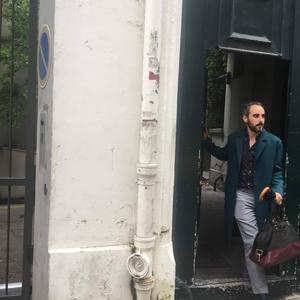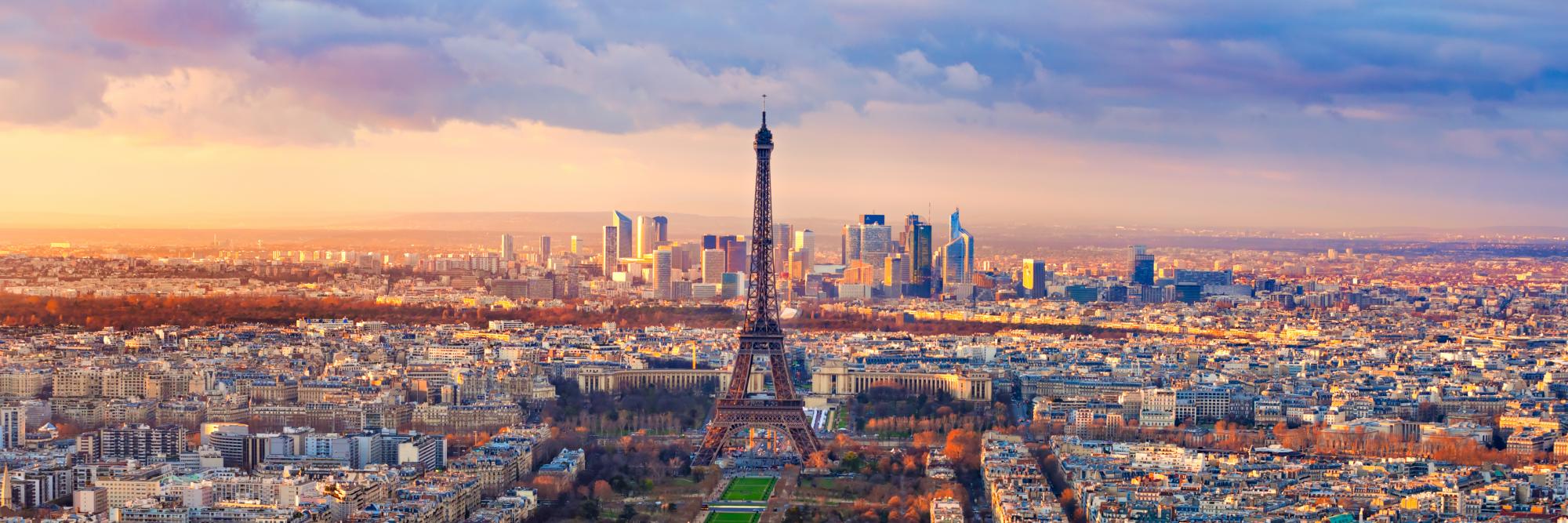Dorian is a non-binary writer, artist, community organizer, and agitator of systems. They have performed at World Pride and Paris Pride, organized Ulsan’s Pride for 3 years, and consider lip-syncing Born This Way on a float a major life milestone. Their published work includes poetry, short stories, and comics that explore the intersections of gender, sexuality and community. They currently find themself in Paris, France, teaching English and putting a dent in the gender wall. Follow their new life in Paris on Instagram.
Read more about expat life in France in our Expat Arrivals country guide.
About Dorian
Q: Where are you originally from?
A: A small town in rural Ontario, Canada. It is best known as “that gas stop” along the highway.
Q: Where are you currently living?
A: After living abroad for several years, I’ve finally settled in Paris, France.
Q: When did you move here?
A: I moved to France in the Spring of 2019.
Q: Is this your first expat experience?
A: Before France, I was living in Korea. Those were four wonderful years, and I still consider Ulsan my home.
Q: Did you move here alone or with a spouse/family?
A: I moved here alone unless you count the 70+ books I brought. Which I do. My room is quite crowded, but at least they’re quiet roommates.
Q: Why did you move; what do you do?
A: I moved to get plugged into queer and literary communities, be surrounded by art and architecture, and devour good cheese. I’m an English teacher and a writer.
Living in Paris
Q: What do you enjoy most about Paris? How would you rate the quality of life compared to your home country?
A: A hard question to answer in a single breath. Of course, there are the art exhibits just a metro ride away, world-class monuments and architecture, and restaurants with vendettas against my waistline. But what I enjoy the most is picking up a simple spread of bread, cheese, and wine from any local shop and then sitting by the Seine with friends.
Q: Any negative experiences? What do you miss most about home?
A: Mexican food. Full-stop. Even though Paris is an international city, Canada is just more multicultural, and international cuisines are more accessible.
Q: What are the biggest adjustments you had to make when settling into expat life here? Did you experience any particular elements of culture shock?
A: Like every Paris-expat blog will tell you: the bureaucracy. Do not underestimate it. You need complex dossiers for everything, and for a new expat, it can be tricky to navigate.
Q: What’s the cost of living compared to home? Is there anything particularly expensive or particularly cheap in France?
A: Compared to Toronto, I find it comparable. I’m spending similar percentages of income on expenses like rent, food, and entertainment from my take-home salary. The key difference is size and quality. I’ll buy a smaller block of cheese than what’s available in your typical grocery store in Canada, but it’s divine. Same with apartments. My apartment may be half of what it was in Toronto, but the building’s history and its location are greater than the square feet. Besides, who moves to Paris to spend all day in their apartment?
Q: How would you rate the public transport in Paris?
A: The public transport is quite extensive and reasonably affordable, but certainly not a pleasant trip. It’s dirty, old, and often not air-conditioned. Overcrowding on metro cars and buses is common. This is nothing like the metros you would find in Korea. Intercity travel is also much more expensive in France than in Korea. How I miss the days of 4,000 KRW (about 4 USD) bus rides to another city! A not-so-uncommon night in Korea often included hanging out at an expat bar like Cima’s, where I would easily meet some people because expats tend to be more open to new friends and new experiences. Before we knew it, we were finishing our beers and hopping on an intercity bus to Busan to continue drinking by the ocean.
Q: How would you rate the healthcare in Paris? Have you had any particularly good/bad experiences with regard to doctors and hospitals?
A: I’ve been fortunate enough not to need to use the healthcare system too much; however, my sliver of experience has shown it is very welcoming to foreigners. Healthcare providers will treat you first and worry about expenses later. In my case, I did not yet have my carte Vitale, which is a public health card that covers expenses. I was told I could be later reimbursed for various expenses I might have incurred.
Q: What are the biggest safety issues facing expats living in Paris or France? Are there any areas expats should avoid?
A: Like any international city, pick-pocketing is a concern. I’ve seen it happen several times on the metro. It may be tempting to live in the banlieue (the peripheral area of central Paris) in order to save on rent, but I do not recommend it! Some areas are not particularly safe – I’m looking at you, St Denis! More importantly, though, you didn’t relocate all the way to Paris to live somewhere that doesn’t look and feel Parisian. Trust me, you don’t want to sit an hour on the RER and then metro just for a quick after-work apéro with friends.
Q: How do you rate the standard of housing in Paris? What different options are available for expats?
A: Housing is hard to come by. It’s a fast market, and you often have to respond to ads within hours of them being posted. There are a lot of options to fit your budget, taste, and needs. I recommend using an agency. It costs, but it’s a more secure route. I opted not to, and I had property owners cancel contracts on me at the last minute. In one apartment in particular, I had even started moving my books into the room when the owner changed his mind! I was stuck with two days to find an apartment, and had to choose one far from central Paris. There are a lot of ways to save money while living abroad, but finding your perfect home is not one of them.
Q: Any areas or suburbs you’d recommend for expats to live in?
A: Of course, every arrondissement (administrative district) has its own charms and tucked-away treasures. The best way is to spend some time exploring them yourself. Personally, I love Saint-Germain-des-Près in the 6th with its mix of beauty, terraces, bookstores, and proximity to gardens and the Seine. For a working Parisian experience with arguably the city’s best park, Buttes-Chaumont, Belleville is worth a perusal.
Meeting people and making friends
Q: How tolerant are the locals of foreigners? Is there obvious discrimination against any particular group? Have you ever experienced discrimination in Paris?
A: As a white foreigner from Canada, I find people are very tolerant towards me. Until they discover how lacking my French skills are. France certainly has its problems with racism. Casual racism is much more casual and common here than in other countries I’ve visited. In regards to sexuality and gender, France has been incredible. Random people regularly compliment me on my non-binary style. My supervisors at work not only tolerate my sexuality but celebrate it. They have made it clear that if I wanted to be out at work, they would fully support me.
Q: Was meeting people and making friends easy? How did you go about meeting new people?
A: With so many events you can attend, making friends is easy. I tend to go to English-speaking poetry and literary events and have made a lot of expat and English-speaking French friends. There is a literary event nearly every night of the week! As an international city, a lot of the friends I’ve made are themselves transient, people coming and going. So, I am a bit concerned about the longevity of friendships and the reality of putting roots down.
Q: Have you made friends with locals, or do you mix mainly with other expats? What advice would you give to new expats looking to make friends with the locals?
A: I have both French and expat friends, but my closest friendships are the ones with expats, mainly because we share a common language. It’s rather obvious advice, but learning the local language really helps. Although my French is passable for routine daily tasks, I lack nuance and personality while communicating in French. This makes building relationships with locals slightly more difficult.
Working in Paris
Q: Was getting a work permit or visa a relatively easy process? Did you tackle the visa process yourself, or did you enlist the services of an immigration consultant?
A: Although I was born in Canada, both my parents immigrated from Portugal. So, I was eligible for citizenship through my local embassy. It’s worth looking into even if just your grandparents were born in a European country because you may be eligible for citizenship. Thanks to the European Union, once you have citizenship with one European nation, you are permitted to work and live in any EU state with relative ease.
Q: What is the economic climate in Paris? Do you have any tips for expats looking to find a job? Which resources did you find most useful?
A: I found my current job by researching schools and submitting my resume before they were advertising on job boards. The hustle is real. I know many teachers who hold multiple jobs or work with speaking agencies (online or in-person) as their in-between while searching for more permanent work.
Q: How does the work culture differ from home? Do you have any tips for expats doing business in Paris or France? Have you had any particularly difficult experiences adapting to local business culture?
A: In my short time here, I’ve learned that the social element at work can be far more important than maximizing productivity. For instance, meetings tend to go on a lot longer than I’m used to because we spend a lot of time socializing.
Final thoughts
Q: Is there any advice you would like to offer new expat arrivals to France?
A: Give yourself a week or two to be a tourist. Visit all the sights and enjoy the ambience of the city. Then, when you start digging in, looking for a job or starting at your new workplace, remember that you’re no longer a tourist but now a resident. So, it’s okay to spend a weekend at home catching up on laundry and Netflix. You’re not on vacation. You can’t go out on an adventure every night of the week. It’s okay to take some time to yourself and embrace the mundane.
► Interviewed October 2019



